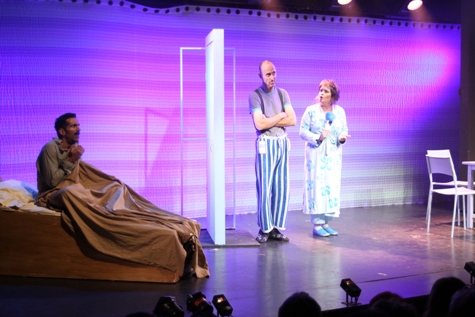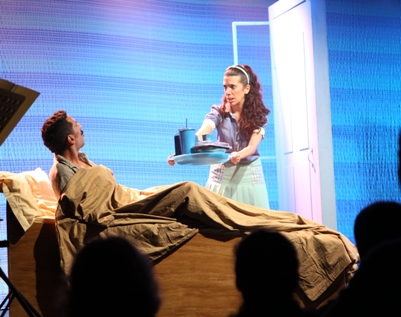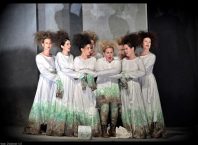Gabi Gadot is every Israeli mother’s blue-eyed dream – an ambitious high-tech whiz who has created a computer virus guaranteed to destroy any hard disk in less than 4 seconds. In HaJilljul, Yoni Lahav’s super-condensed (only 30 minutes long) satiric musical rendition of Kafka’s Metamorphosis translated to contemporary Israeli culture, Gabi wakes up on the morning of his big presentation to find that he has turned into…an Arab! Directed by Tal Brenner, HaJilljul premiered December 23 at Tzavta as part of the Short Theatre Festival, it rocked the house. At one point, the audience was laughing so hard they stopped the show to wait for the laughter to subside. Although I enjoyed the play enormously, there was also something disturbing about that laughter, but perhaps that is the point.
The text plays on all the existing cultural stereotypes in bold, broad brushstrokes and subtle nuances, never forgetting for a moment that it is playing to the very crowd it mocks: the Tzavta audience – the sensitive, intelligent, open-minded, left-wing Israeli who is well-versed in Kafka. It is all the more funny for its fidelity to Kafka; the structure of the story is an almost exact parallel, with hilarious reference points along the way. The set is simple, yet eloquent. A free-standing door divides the stage; Gabi’s bed is on one side, with composer Moshe Zorman on piano, Yoni Dror on flute and Asaf Roth on percussion just beyond the bed. On the other side of the stage is a small table with three chairs.

One of the cultural reflexes I have developed over the past few years is that whenever I see a space onstage divided by something that looks like a wall, it gives me pause and evokes a certain muscle tension. This feeling is augmented by the insistent color scheme of the play: everyone and everything is in turquoise and white, except for Gabi. The nationalistic motif is expressed in the music and movement. The melodies recalling children’s songs (a time-honored way of instilling beliefs in the young and impressionable) and the familiar steps of folk dances find their way into this tightly condensed play as well.

The opening is straight from Kafka – Gabi (Yossi Zabari) wakes from “uneasy dreams” and finds himself altered, his upper lip adorned with a moustache and unfamiliar words emerging from his throat, just like Gregor Samsa who “had a shock as he heard his own voice.” But in this case, what emerges is not “a persistent horrible twittering squeak” but Arabic phrases. The family structure is similar, in both stories the parents and sister live off the son’s earnings, with a huge debt to the “chief” hanging over their heads. Gabi’s fear and confusion keeps him barricaded in his room, while on the other side of the partition his loving parents, played by Orna Rotberg and Nir Ron, worry about the impact on their finances as an ominous knock (the chief – played by Yariv Kook) is heard at the door. Gabi’s sister, Avia Brosh, who “was just getting dressed”, enters the conversation, barely looking up from her cellphone, worried about fulfilling her own immediate material needs.
In Kafka, Gregor’s emergence is met with the ultimate understatement, “oh”, which takes a comic turn here to the ubiquitous Yiddish “oy.” Sister responds in the only way possible for an Israeli teenage girl: she takes his picture with her cell phone. To avoid any possible confusion, the situation is explicitly describedd: Gabi has become an Arab. At that point everyone and everything moves at an accelerated pace, and there is not a step out of place.

Gabi’s family reveals the prejudice that lies beneath a façade of openness and tolerance, in a carnival of clichés entertainingly set to music and movement (well choreographed by Gabi himself, Yossi Zabari), creating the sort of experience where saying “we laughed until we cried” acquires another layer of meaning. From the father’s (literally) show-stopping self-descriptive solo “Of course you all know me/I always vote for the Meretz (left-wing) party,” to the sister’s well-intentioned pretentious offerings of exotic delicacies (including whale testicles) accompanied by a Latin-flavored dance, the cultural references are painfully accurate, funny and brilliantly executed by the talented cast.
One of the most ironic moments occurs when the mother enters Gabi’s room and he sings to her in the tradition of Israeli children’s songs to their mothers (an entire cultural mini-genre) – “Mother, oh mother, hold me tight/I am a human, not just some insect,” while Rotberg recoils in barely concealed disgust. The “otherness” thrust upon Gabi by the stereotypical representation – moustached hummous eater, pita-seller, drug dealer, doesn’t leave him many options within this family.
HaJilljul is well-written and directed, with a talented cast. I laughed with the rest of the Tzavta audience – who all looked a lot like the Gadot family onstage, myself included. The play works because the stereotypes touch on some painful truths. Perhaps it’s best to let Kafka have the last word: “But what if all the quiet, the comfort, the contentment were now to end in horror?”
HaJilljul by Yoni Lahav
Directed by Tal Brenner
Music: Moshe Zorman, Movement: Yossi Zabari
Assistant director: Shanit Kadosh
Musicians: Moshe Zorman, Yoni Dror, Asaf Roth
Gabi Gadot: Yossi Zabari
Mother: Orna Rotberg, Father: Nir Ron
Sister: Avia Brosh, Managing Director: Yariv Kook





